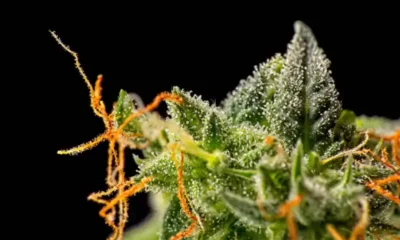Connect with us
Published
2 years agoon

As legal cannabis prevails in states throughout the country, with more regions embracing reform as time goes on, we’re collectively gaining a greater understanding of how this new market impacts those communities.
Namely, a new study published by Rutgers University and funded by the New Jersey State Policy Lab turned to municipalities in New Jersey, one of the most recent states to legalize adult-use cannabis, and ultimately found that the establishment of cannabis businesses is associated with increased home values.
New Jersey citizens voted to legalize the consumption, production and distribution of cannabis products in the 2020 election. New Jersey municipalities cannot prevent individuals from possessing or consuming cannabis, though they have the option to regulate and ban cannabis-related businesses in their own jurisdictions.
By fall of 2021, more than 60% of New Jersey municipalities voted to ban local cannabis-related businesses, which authors argue will “likely have important economic and social impacts on N.J. local governments.” One example authors offer is the generation, or lack thereof, of local tax revenue through cannabis, noting that in the second quarter of 2022 alone, New Jersey saw more than $4.6 million in tax revenue statewide.
Using a cross-sectional data set, researchers compiled all New Jersey municipalities in 2021 to address their first research question, “What factors explain why some of N.J. municipalities opted to allow cannabis-related businesses and others did not?”
The analysis found that more than 33% of municipalities that allowed cannabis-related businesses had at least one neighboring municipality that also opted in, more than 8 percentage points higher than the average for the subsample of municipalities that did not allow cannabis-related businesses. They also found that the average “opt-in” municipality has a higher population, less elderly residents, a slightly higher property tax rate and significantly lower equalized property values per capita.
Researchers then created a panel dataset on residential home sales at the parcel-level to address their second research question, “What is the effect of allowing cannabis-related businesses on residential home sale prices?”
The results suggest that the average home sale price increased by nearly 2% after August 2021 in municipalities that allowed cannabis-related business, compared to those that did not allow these businesses. Researchers say that it’s possible other unobservable factors they could not control for could be the cause of the increase in home sales, though they acknowledged that “allowing cannabis-related businesses does not negatively impact home sales prices.”
“In terms of policy recommendations, our results suggest state and local policymakers can be cautiously optimistic about the short-run impacts of allowing cannabis-related businesses in their jurisdictions,” the authors conclude, adding that the results indicate that the poorest municipalities and those with the lowest level of property wealth are most likely to allow cannabis-related businesses in their jurisdictions.
“If future research finds negative social costs on the community from cannabis-related businesses, then these social costs will be absorbed mainly in the most disadvantaged parts of the state,” researchers added. “Therefore, we recommend that state and local policymakers should continue to evaluate the impacts of these cannabis-related businesses on individuals and communities moving forward.”
The research echoes previous findings, which similarly reported increased home values for properties located in close proximity to licensed cannabis establishments and states that have legalized adult-use cannabis.
One 2019 study from Clever Real Estate found that states with legal cannabis see an almost instant uptick in home values, focusing on home prices in Colorado and Washington. A 2021 study from Clever Real Estate disclosed that Denver has seen the most significant growth, with a 67.8% increase in property values since retail dispensaries first opened their doors on January 1, 2014.Another 2021 study published in the IZA Journal of Labor Economics looked at the effects of recreational cannabis on labor markets in Colorado and found that local jurisdictions permitting licensed cannabis operations saw higher rates of job growth compared to localities that prohibit them.


Despite City Efforts, Hemp Shops Posing as Dispensaries Prevail in Las Vegas


Cannabis Community, Investors React to DEA Decision To Reschedule


Georgia Governor Signs Bill Establishing Licensing Requirements To Grow Hemp


Study: Psilocybin Enhances Meditation


Ohio GOP Lawmakers Debate Adult-Use MJ Priorities, Eye June for Regulation Approval


Taylor Swift Puts Narcotics Into All of Her Songs on ‘The Tortured Poets Department’
